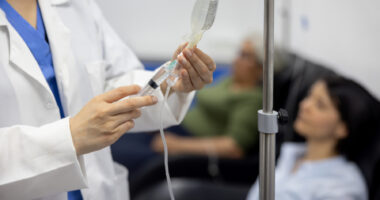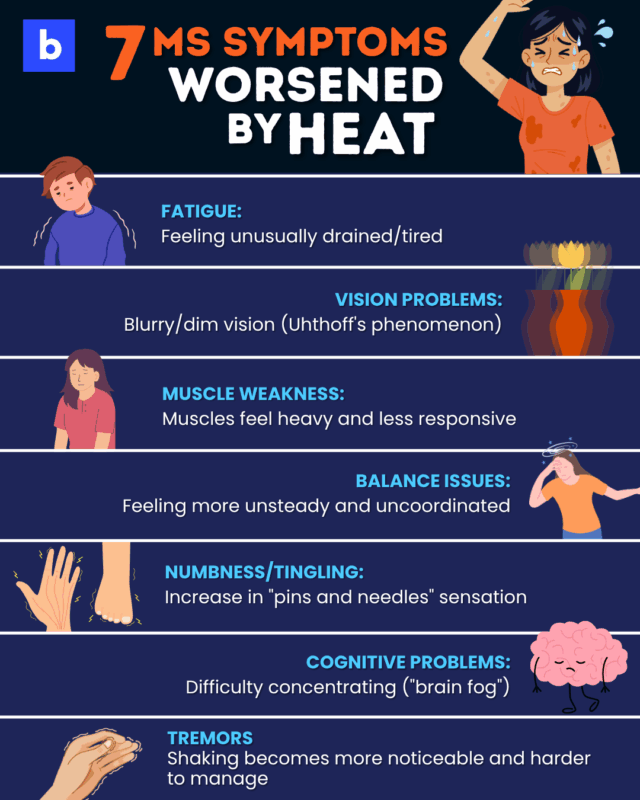
7 common MS symptoms that worsen with heat
Last updated July 16, 2025, by Roslyn Marano

If you live with multiple sclerosis (MS), you may notice that your symptoms feel worse when you’re hot. This is called heat sensitivity, and it’s very common with MS.
Whether from hot weather, a warm shower, or even a fever, a rise in body temperature can temporarily worsen MS symptoms. This happens because heat slows down the electrical signals your brain sends through your nerves to control things like movement, vision, and cognition.
In MS, where the nerves are already damaged, this can cause your symptoms to flare up. While it might feel like you’re having a relapse, heat-related symptoms don’t mean your MS is getting worse.
These flare-ups are only temporary and usually go away once your body cools down. That’s why they’re often called “pseudo-relapses” — they mimic real relapses but aren’t caused by new damage or disease activity.
Here are seven MS symptoms that often worsen when your body gets too warm.
1. Fatigue
Feeling tired is already one of the most common symptoms of MS, and heat can make it even more intense. A small increase in body temperature may leave you feeling unusually drained, even if you haven’t done much physical activity.
2. Vision problems
Some people notice their vision becomes blurry or dim when they’re overheated. This is known as Uhthoff’s phenomenon and is especially likely if you have optic nerve damage. The good news is that your vision usually returns to normal once your body temperature goes back down.
3. Muscle weakness
Warm temperatures can cause muscles to feel heavier and less responsive. You might find that walking, lifting objects, or even standing requires more effort than usual. The heat can interfere with nerve signals, making muscles feel less responsive.
4. Balance issues
Heat can affect your sense of balance, making you feel more unsteady than usual. When nerve signals are already disrupted by MS, higher temperatures can make it even harder to stay coordinated.
5. Numbness or tingling
You may notice an increase in numbness, tingling, or that “pins and needles” sensation when your body gets too warm. These sensations often appear in the hands, feet, face, or other areas where MS symptoms have occurred before.
6. Cognitive problems
Difficulty concentrating, thinking clearly, or remembering things can become more noticeable in the heat. These cognitive changes — sometimes described as “brain fog”— are common in MS and may worsen with a rise in temperature.
7. Tremors
Shaking or tremors can become more noticeable in the heat and can also worsen your speech. Warm temperatures may disrupt how your brain sends signals to your muscles, which can make tremors feel more pronounced or harder to manage. This is common for people with MS and should improve once your body cools down.

What you can do
While heat sensitivity doesn’t mean your MS is getting worse, it can make daily life more difficult. Some easy ways to stay cool and feel better include:
- using fans and air conditioning, and, if possible, staying indoors during the hottest part of the day
- staying hydrated by drinking cool water throughout the day to help your body control its temperature
- dressing smart by wearing lightweight, breathable clothing
- trying cooling products such as vests, neck wraps, or a damp cloth to help lower your body temperature
- planning ahead by doing chores or exercising in the morning or evening when it’s cooler outside.
MS symptoms exacerbated by heat can be frustrating, but they’re usually short-lived.
If you frequently find that the heat is affecting you, discuss additional ways to stay safe and comfortable with your healthcare provider.
Multiple Sclerosis News Today is strictly a news and information website about the disease. It does not provide medical advice, diagnosis, or treatment. This content is not intended to be a substitute for professional medical advice, diagnosis, or treatment. Always seek the advice of your physician or other qualified health provider with any questions you may have regarding a medical condition. Never disregard professional medical advice or delay in seeking it because of something you have read on this website.




